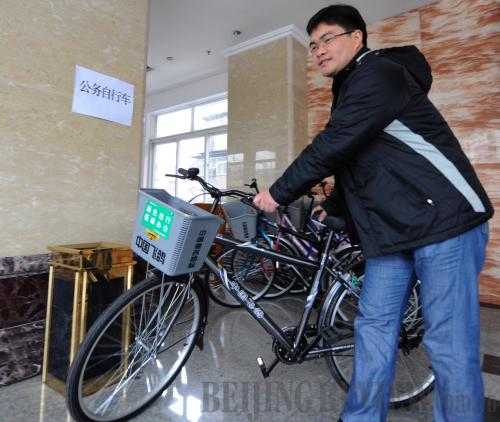|
 |
|
BY BICYCLE: Bicycling is popular with the civil servants of a government department in Hubei Province (XINHUA) |
Kindergarten Policy
Eleven illegal kindergartens for migrant workers' children in a village of Beijing's Fengtai District were shut down on April 10 because of hidden dangers in the old houses, fire risk and sanitation problems. Although it's a move to protect the children there, the shutdown will throw hundreds of children into the difficult condition of having nowhere to stay before they go to primary school.
If relevant departments do not shut down these kindergartens, it's irresponsible toward the children, but if the kindergartens are simply closed, where will the children go? Before making their decisions, these departments should first take into account alternative placement for the children affected.
It is the local government's responsibility to provide migrant workers' children with basic educational opportunities. It's not impossible. Nanjing, capital city of Jiangsu Province, will begin to offer 170,000 preschoolers an annual subsidy of 2,000 yuan ($298.5) from September, covering migrant workers' children.
The State Council has already clearly said preschool education should be developed into a well-designed system to cover both urban and rural areas and children should be ensured basic, quality preschool education. It's hoped this policy can be tangibly implemented, so these children in Fengtai will find somewhere to spend their preschool days.
Beijing Times
Social Capital
China's biggest public rental housing project of 2011 was recently launched in Qingdao, Shandong Province, with a quarter of its capital being investment from society at large. It shows private investment can play an important role in the construction of government-subsidized housing projects.
But, since the construction of government-subsidized houses is not very profitable, the method of attracting social capital becomes a problem. It's unrealistic to ask real estate developers to give up their economic interests and turn to charity, so the key for the government is to work out effective incentive mechanisms to encourage the involvement of social capital.
Take the development of slum areas, for example. These districts can be divided into two ways, one of high development value and the other of low value. Because of the former, due to foreseeable profits, developers are naturally willing to take part. When it comes to areas of low development value, government needs to offer preferential policies to developers, such as tax reduction and exemption, and favorable land transfer fee. When there is enough social investment to fill in the capital gap and the public is provided with adequate relocation subsidies, disputes and hindrance to these development projects will naturally decline.
Businesses live and work for interests, and this is the market rule. How to make best use of this rule to benefit both businesses and the public poses a test for the government.
People's Daily
Medical Resourcing
To ensure everyone a basic health care service is one of China's health care reform objectives, especially true for public hospitals. But, the People's Hospital of Zhengzhou, in Henan Province, has preserved a lot of expensive luxury wards while relatively cheap, common wards are unable to meet demand and sometimes patients have to lie on temporary corridor beds.
These luxury wards are reserved for VIP members, and the average patient is not allowed even if they can afford to pay. It's OK for the rich, or the privileged, to pay for VIP service, but public hospitals are different from other service sectors. These hospitals' medical resources are limited. When luxury wards take up too many resources, common patients will be deprived.
A large number of VIP wards have impaired basic equality in medical services. When medical fees and resources are still a big problem on average person, public hospitals should reflect on deficiencies in their service and try to make it fair and equal, instead of squeezing out common wards for luxury ones.
The responsibility of hospitals, especially public hospitals, is to heal the wounded and save the dying. They are not supposed to be profit-driven companies. When greater numbers become VIP members, hospitals might begin to charge heavily. When this has developed onto a certain scale, good medical resources will be farther and farther away from ordinary people.
Hospital VIP service is able to fulfill people's high-end requirements, but given overall medical services are still insufficient, excessive VIP service will push limited medical resources to a small number of people, leading to increasingly serious inequality.
Xi'an Evening News
Official Bicycles
Civil servants working for the Education Bureau of the Jinniu District in Chengdu, Sichuan Province, who take a business journey of less than 3 km will in future not be offered cars but have to ride bicycles, and the bureau has already purchased five bicycles.
Civil servants using bicycles for business purposes is not news. Last December, a provincial government department in Hubei Province purchased a number of bicycles for its civil servants to use for nearby business.
Civil servants may see bicycles as undignified using them. It's important to help them get rid of this discrimination against bicycles and make bureaucrats feel like they should use them in daily work.
The use of bicycles on short business trips may not be all that significant, but it at least highlights ideas such as energy conservation, frugality and contact with the people. These concepts will help to push forward the country's reform of official car use.
Yangtze Evening News | 